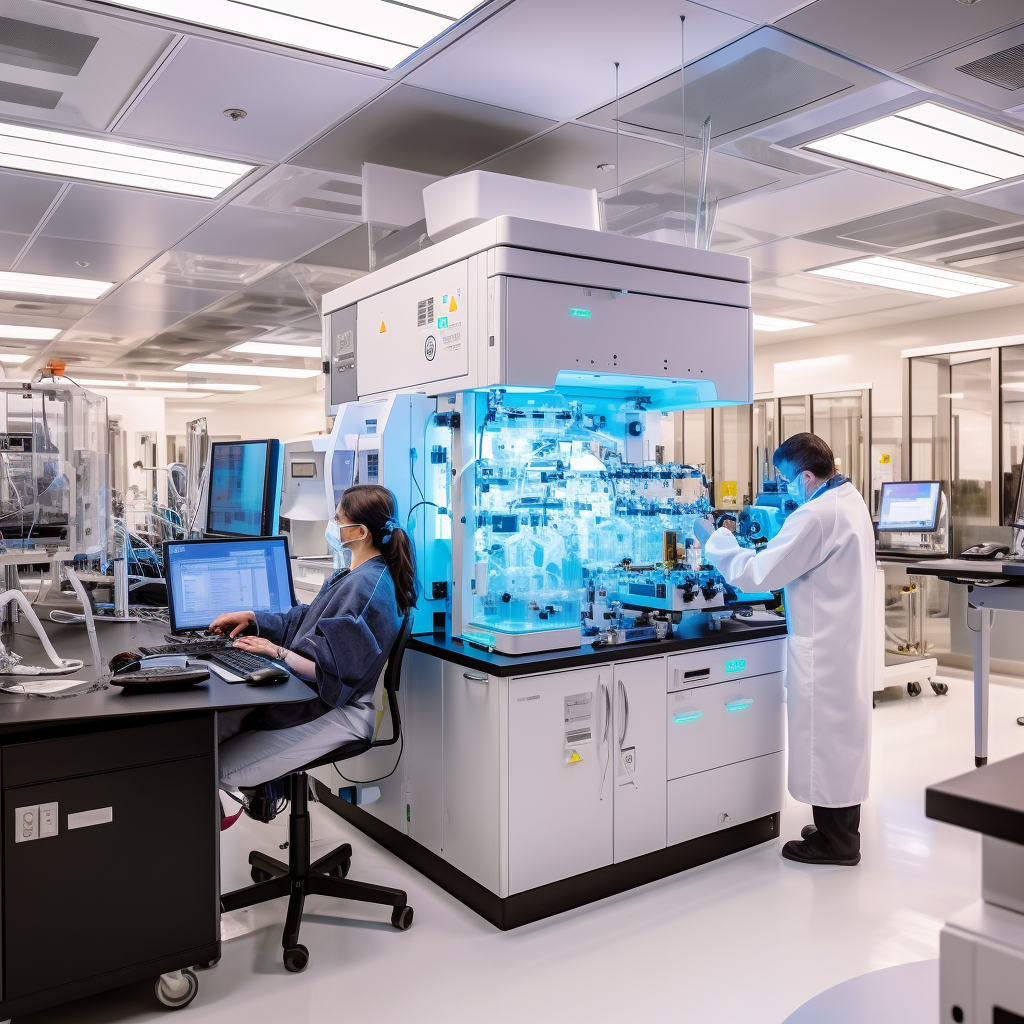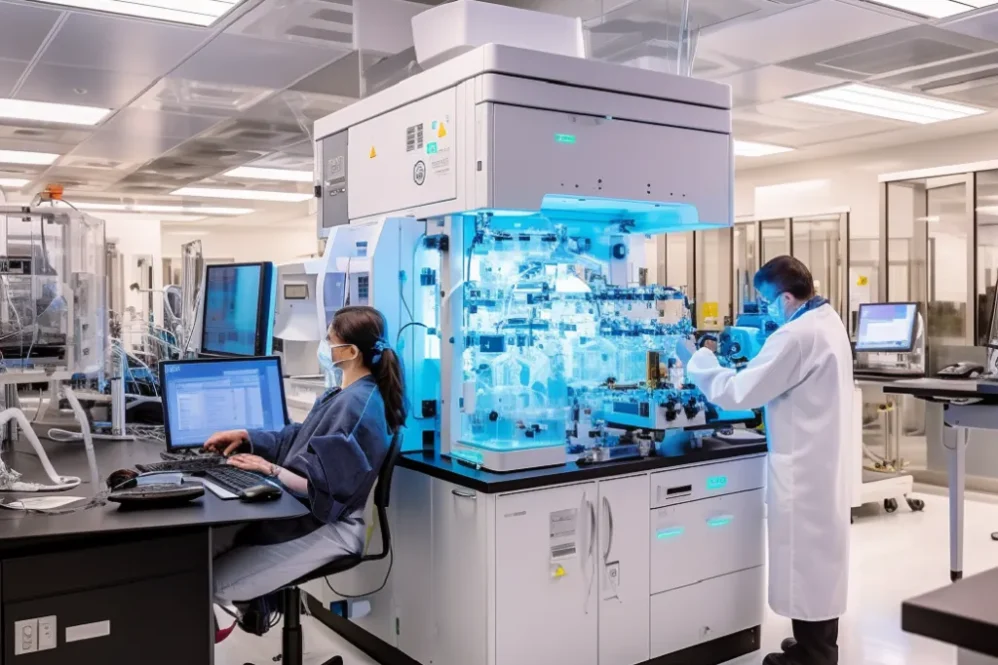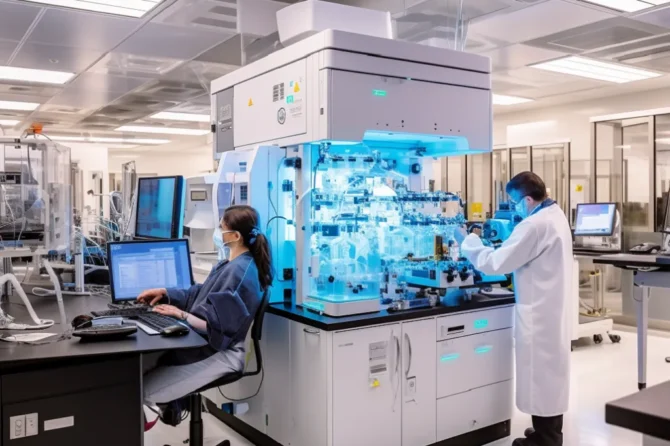Introduction:
The field of genomics has experienced a paradigm shift with the introduction of next-generation sequencing (NGS) technologies. These cutting-edge methods have not only revolutionized the way DNA and RNA sequencing is conducted but have also transformed the entire landscape of genomic research and its applications. The landmark achievement of the Human Genome Project marked a crucial milestone in deciphering the human genetic blueprint, but it was NGS that truly democratized genomics and propelled it into a new era of possibilities.
With the ability to analyze vast amounts of genetic information rapidly and affordably, NGS has empowered researchers to explore the genomes of diverse organisms, unravel the complexities of genetic diseases, and gain unprecedented insights into the fundamental mechanisms that underpin life. As we continue to harness the power of NGS and delve deeper into the intricate genomic fabric of life, we stand on the cusp of revolutionary advancements that hold the promise of transforming healthcare, biology, and our understanding of the natural world.
From personalized medicine tailored to an individual’s genetic makeup to the elucidation of complex genetic traits and the study of intricate ecological interactions, NGS has opened doors to a multitude of opportunities that were once deemed distant aspirations. This introduction will delve into the key aspects of NGS, its significance in personalized medicine, disease prevention, and scientific research, and the potential it holds for driving groundbreaking discoveries in the years to come.
Next-Generation Sequencing:
Transforming Genomics: Next-generation sequencing (NGS) platforms have revolutionized the field of genomics, propelling our understanding of human biology to unprecedented heights and opening up new frontiers in personalized medicine, disease prevention, and scientific research. With the ability to generate millions of DNA sequences in a single run, NGS has surpassed the laborious and costly methods of the past, making the process of DNA and RNA sequencing faster, more efficient, and affordable.
The tremendous throughput of NGS has empowered researchers to undertake ambitious projects that were previously inconceivable. A shining example of this is the 1000 Genomes Project, an international collaboration aiming to comprehensively catalog human genetic variation across diverse populations. This ambitious endeavor has shed light on the vast genetic diversity within the human species, enhancing our understanding of population genetics and ancestry.
The exponential growth of genomic data generated by NGS has been accompanied by the development of sophisticated bioinformatics tools and algorithms. These advancements have paved the way for data analysis on an unprecedented scale, enabling researchers to unravel the complexities of the human genome. Scientists can now identify disease-associated genetic variants with precision, leading to the discovery of genetic risk factors for a wide range of diseases, from common complex disorders to rare genetic conditions.
One of the most significant breakthroughs enabled by NGS is the elucidation of the molecular mechanisms underlying cancer. With the ability to sequence entire cancer genomes, researchers can identify specific genetic alterations that drive cancer initiation and progression. This has led to the development of targeted therapies and precision medicine approaches that offer more effective and personalized treatment options for cancer patients.
NGS in Personalized Medicine and Clinical Diagnostics:
Moreover, NGS technologies have had a profound impact on clinical diagnostics and personalized medicine. Whole-exome sequencing has emerged as a valuable tool for diagnosing rare genetic disorders by focusing on protein-coding regions of the genome. Targeted gene panels allow for the screening of specific genetic mutations associated with cancer, facilitating more precise treatment options. Non-invasive prenatal testing (NIPT) has also been made possible through NGS, enabling the detection of fetal genetic abnormalities using fragments of fetal DNA in maternal blood, thereby minimizing the need for invasive procedures and associated risks.
Direct-to-Consumer Genetic Testing and Beyond:

Next-generation sequencing (NGS) has profoundly impacted genomics, enabling the rapid generation of millions of DNA sequences in a single run. This advancement empowered researchers to undertake ambitious projects like the 1000 Genomes Project, cataloging human genetic variation comprehensively. The vast data output has driven the development of sophisticated bioinformatics tools, leading to disease-associated genetic variant identification, cancer molecular mechanism unraveling, and exploration of gene-environment interactions.
The influence of NGS extends beyond scientific and medical realms, giving rise to direct-to-consumer genetic testing services like 23andMe and AncestryDNA. These services offer affordable and accessible ways for individuals to explore ancestry, assess health risks, and understand their responses to specific medications.
Direct-to-consumer genetic testing democratizes genomic information, enabling people to take a proactive role in their health management without requiring healthcare providers’ involvement. Ancestry testing is a popular feature, allowing individuals to trace their genetic roots and discover ancestral heritage. This feature fosters curiosity about heritage and facilitates connections with distant relatives.
Another vital aspect is assessing health risks through genetic variations associated with various conditions. This information empowers individuals to make informed decisions about lifestyle, early detection, and preventive measures.
Additionally, these services offer insights into how genetic makeup may impact medication response. Pharmacogenetic testing identifies genetic variations affecting drug metabolism, facilitating personalized and effective treatment plans.
NGS in Other Fields of Research:
The advent of next-generation sequencing (NGS) technologies has had a profound impact on multiple fields beyond medicine and genomics, including evolutionary biology, agriculture, and environmental science. With the ability to rapidly sequence genomes of various species, researchers can now delve into a plethora of exciting research areas.
In evolutionary biology, NGS has transformed the study of the tree of life and species relationships. By comparing the genomes of different organisms, scientists can reconstruct their evolutionary history and understand how species have diverged and evolved over time. NGS has facilitated the identification of genetic variations responsible for adaptations to different environments, shedding light on the molecular basis of evolutionary processes.
In agriculture, NGS has revolutionized crop breeding and improvement. By sequencing the genomes of agriculturally important plants and animals, researchers can identify genes responsible for desirable traits such as drought tolerance, disease resistance, and higher yield. This information allows for targeted breeding strategies, accelerating the development of improved crop varieties that can better withstand environmental challenges and contribute to food security.
Environmental science has also greatly benefited from NGS applications. By analyzing the genetic material present in environmental samples, such as soil, water, or air, researchers can assess biodiversity and study the ecological interactions between different species. Additionally, NGS enables the investigation of the impact of environmental factors on gene expression patterns in various organisms, providing valuable insights into how ecosystems respond to changing environmental conditions.
The versatility of NGS technologies has opened up new horizons for researchers in evolutionary biology, agriculture, and environmental science. The ability to rapidly and cost-effectively sequence genomes has propelled these fields forward, enabling discoveries that were previously unattainable. As NGS continues to evolve and improve, its applications in these areas are likely to expand further, offering exciting opportunities for advancements in our understanding of the natural world and its complex interactions.
NGS in Infectious Disease Research:
NGS has also played a crucial role in the field of infectious disease research. By sequencing the genomes of pathogens, scientists can track the spread of outbreaks, identify drug-resistant strains, and develop targeted interventions. For example, during the COVID-19 pandemic, NGS has been instrumental in understanding the genetic makeup of the SARS-CoV-2 virus and monitoring its evolution.
Ethical Considerations and Challenges:
While the benefits of NGS technologies are evident, several challenges and ethical considerations must be addressed. Data privacy and security are major concerns, as there is a risk of unauthorized access and potential misuse of genetic information. Proper data encryption, secure storage, and stringent access controls are crucial to protect individuals’ privacy and maintain public trust in genomics research.
Additionally, the interpretation of genetic data can be complex, and there is a need for better communication between healthcare professionals and patients to ensure responsible and effective use of the information. Genetic counseling and education play a vital role in helping individuals understand the implications of their genetic information, including potential health risks, treatment options, and ethical considerations.
Ensuring Equitable Access and Addressing Disparities:
Another challenge is the potential for disparities in access to NGS technologies and the benefits they offer. Efforts must be made to bridge the “sequencing divide” and promote inclusivity in genomics research and healthcare, ensuring that advancements are accessible to all individuals, regardless of their socioeconomic status or geographic location.
Robust Regulations and Collaborative Efforts:
In addition to access, robust regulatory frameworks are needed to govern the use of NGS technologies. Guidelines and standards should be established to ensure the quality and accuracy of sequencing results, the appropriate use of genetic information, and the responsible conduct of research. Ethical considerations regarding consent, data sharing, and potential discrimination must be carefully addressed to safeguard individuals’ rights and promote public trust in genomics research.
Collaboration and data sharing among researchers and institutions are also essential for maximizing the potential of NGS technologies. By promoting open science and fostering collaborations, researchers can accelerate discoveries and advancements in genomics.
Conclusion:
In conclusion, next-generation sequencing (NGS) technologies have revolutionized the field of genomics, propelling our understanding of human biology and opening up new frontiers in personalized medicine, disease prevention, and scientific research. With the ability to generate millions of DNA sequences in a single run, NGS has facilitated ambitious projects like the 1000 Genomes Project, leading to comprehensive catalogs of human genetic variation. The sheer volume of data generated by NGS has spurred the development of sophisticated bioinformatics tools and algorithms, enabling researchers to analyze and interpret these vast datasets. As a result, scientists can now identify disease-associated genetic variants, unravel the molecular mechanisms of complex diseases like cancer, and explore intricate gene-environment interactions with unprecedented detail and accuracy.
Despite the remarkable progress facilitated by NGS, it is vital to address the challenges and ethical considerations associated with these technologies to ensure their benefits are realized in a responsible and equitable manner. One critical aspect is data privacy and security, as NGS generates vast amounts of sensitive genetic and health-related information. Robust data protection measures must be implemented to safeguard individuals’ privacy and prevent unauthorized use of genomic data. Additionally, ensuring equitable access to NGS technologies and the knowledge they produce is crucial. Bridging the “genomic divide” is essential to avoid exacerbating existing health disparities and to enable individuals and communities worldwide to benefit from advancements in genomics.
Effective communication and public engagement are also paramount in the era of NGS. The complexities of genomics can be challenging to communicate to the general public, and misinterpretation or misinformation can lead to misunderstandings and ethical concerns. Therefore, clear and transparent communication about the benefits, risks, and limitations of NGS is necessary to foster public trust and promote informed decision-making. Engaging stakeholders, including patients, researchers, policymakers, and ethicists, in ongoing discussions about the ethical implications of NGS can guide the development of responsible guidelines and policies that protect individual rights and promote the greater good.
In conclusion, next-generation sequencing technologies have opened unprecedented opportunities for scientific progress and medical breakthroughs. By harnessing the power of NGS while being mindful of ethical considerations, we can ensure that genomics benefits humanity in a sustainable and equitable manner. Embracing the potential of NGS and responsibly navigating its challenges will shape a promising future for genomics, ushering in a new era of personalized healthcare, disease prevention, and scientific discovery that benefits individuals and communities worldwide.
If you need more information on this article click on the following link. This link will provide more extensive information and elaborate on the topic.
Genomic.News is your ultimate source for curated news, articles, and updates on the fascinating world of genomics. Our platform brings together the latest scientific breakthroughs, research advancements, and industry developments in one centralized hub. Stay informed about the cutting-edge discoveries, transformative technologies, and ethical considerations driving the field of genomics. Explore the intersection of genetics and healthcare, agriculture, biotechnology, and beyond.





